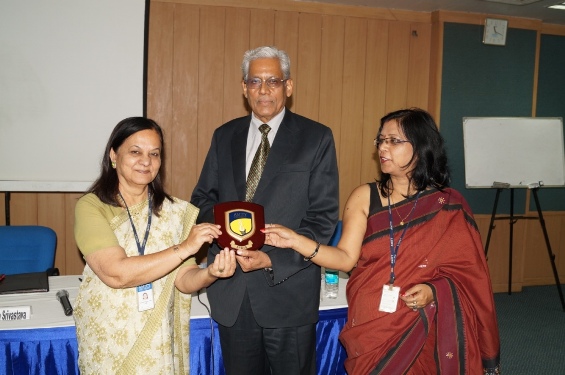14 May 2013|Noida | F-3 MDP Hall, Amity University Campus, Sector-125 Noida
Amity Law School Centre – II, AUUP organises one day Seminar-cum-Faculty Development Program on the topic “Family Law: New Socio-Legal Perspectives in the context of Modern Society”

Amity Law School Centre – II in association with Amity Academic Staff College organized a one day Seminar-cum-Faculty Development Program on the topic “Family Law: New Socio-Legal Perspectives in the context of Modern Society”. Mr. Justice S.N Srivastava, Former Judge – Allahabad High Court; Mr. Justice Fakhruddin, Former Judge – Madhya Pradesh High Court and Chattisgarh High Court; Prof. (Dr.) Rajiv Khanna, Former Professor – Campus Law Centre, Delhi University; Prof. VPS Arora, Dean – Academics, Amity University; Dr. Malathi Subramanium, Director - Amity Academic Staff College; Prof. Mamta Srivastava, Additional Director- Amity Law School Centre-II were present during the seminar.
While welcoming the panelists and giving the brief overview of the seminar, Prof. Mamta Srivastava, Additional Director- Amity Law School Centre-II said that in India, the sanctity of marriage is deeply rooted. There is plethora of personal laws in our country which govern the marriage and divorce issues amongst different religions like Hindu Marriage & Divorce Act, Muslim Personal Law, Special Marriage Act, Indian Divorce Act etc. Prof. Srivastava added that in recent times the concept of marriage has lost its sanctity by young generation. Today youth prefers live in relationship instead of getting married which is creating many legal, social controversies.
Justice S.N Srivastava, Former Judge – Allahabad High Court said that Article 21 of Constitution relates with Right to Live and Liberty which was further elaborated by Supreme Court of India on several occasions. While presenting the advantages of live in relationships, Justice Srivastava said that in live in relationship there is freedom to any of the partner to live together as long they want. There is no commitment, very less responsibility and very easy to breakup. Live in relationship can be best described as perfect rehearsal of married life, opined Justice Srivastava. Expressing his observation on the status of legitimacy of child out of the live in relationship, he said that under Hindu Marriage Act Amendment of 1976, it has been described that whether the marriage is void or voidable, child will always be legal entity. While commenting on institution of marriage, Justice Srivastava said that according to Indian Philosophy, marriages are made in heaven and performed on earth. Justice Srivastava however said that live in relationship is unacceptable as far as social fabric of our system is concerned.
Justice Fakhruddin, Former Judge – Madhya Pradesh High Court and Chattisgarh High Court briefed about the remedies in case of problematic live-in relationship where he threw light on secular provision of Criminal Procedure Code, wherein a woman can claim maintenance. While sharing his views on live in relationship, Justice Fakhruddin said that it is very difficult to rely on any person in temporary arrangements.
Prof. (Dr.) Rajiv Khanna, Former Professor – Campus Law Centre, Delhi University while delivering his talk on the topic “The conservative approach of glancing marriages and personal laws in India” said that India has seen many societal and cultural changes in last few centuries. The society was always divided amongst religion, caste and gotras. Bigamy and polygamy were part of tradition amongst Hindus and Muslims. The major reform in marriage was made with the enactment of Special Marriage Act 1954 wherein inter religion, inter caste marriage without religious formalities in the form of court marriage to all citizens of India was enacted. Under this law, religion has no role and the concept of monogamy was introduced. In 1955, Hindu Marriage Act brought radical changes in marriage by Hindus. In its ambit apart from Hindus; Sikhs, Jain, Buddhist were also included. It also introduced monogamy and concept of divorce. It completely abolished castes in marriages. This law also decided the marriageable age for man and woman. Marriages in Muslims and Parsis communities are governed by their respective personal laws. Prof. Khanna said that the dream of having unified civil court for marriages is still not achieved even after 65 years of Independence. Marriages and divorce in India is still governed by different personal laws.
Ms. Naresh Bakshi, Advocate on Record – Supreme Court of India presented her talk on the topic “Live-in at International Plane”. Ms. Bakshi said that Supreme Court of India in Khushboo Vs Kanniammal judgment for the first time gave recognition to live in relation. Ms. Bakshi said that in USA there is provision of granting maintenance to a woman who had lived for a substantial period with a man without marrying him.
Prof. VPS Arora, Dean – Academics, Amity University Indian culture and tradition in terms of family bonding has been appreciated world over. But in recent times there have been structural changes in the core structure of family. In cities, nuclear family is a normal norm and there is hardly any respect for elders now. This is not a healthy development. Joint family has its own advantages and nuclear family has its own disadvantages. Today youngsters are looking ways to avoid marriage and adopt the culture of live in relationship which is still not accepted by our society.
Law professionals, Faculty from Amity Law School Centre-II were present during the faculty development program.